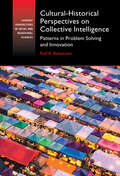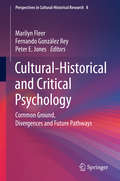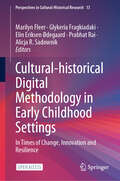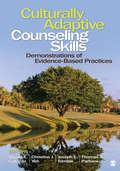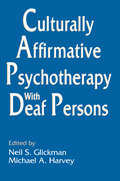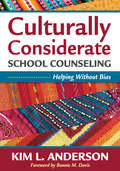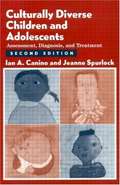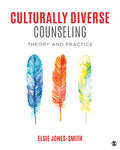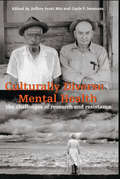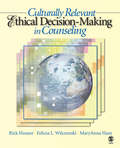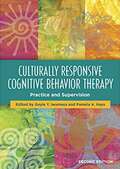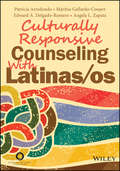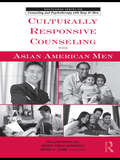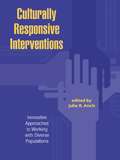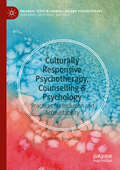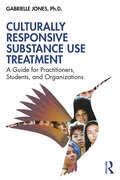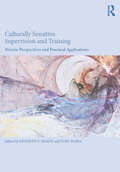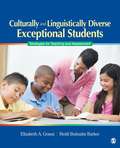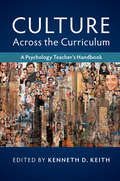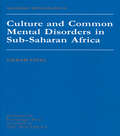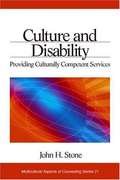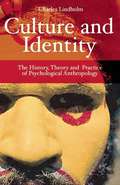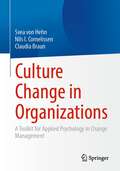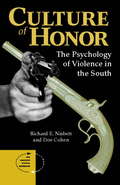- Table View
- List View
Cultural-Historical Perspectives on Collective Intelligence: Patterns in Problem Solving and Innovation (Current Perspectives in Social and Behavioral Sciences)
by Rolf K. BaltzersenIn the era of digital communication, collective problem solving is increasingly important. Large groups can now resolve issues together in completely different ways, which has transformed the arts, sciences, business, education, technology, and medicine. Collective intelligence is something we share with animals and is different from machine learning and artificial intelligence. To design and utilize human collective intelligence, we must understand how its problem-solving mechanisms work. From democracy in ancient Athens, through the invention of the printing press, to COVID-19, this book analyzes how humans developed the ability to find solutions together. This wide-ranging, thought-provoking book is a game-changer for those working strategically with collective problem solving within organizations and using a variety of innovative methods. It sheds light on how humans work effectively alongside machines to confront challenges that are more urgent than what humanity has faced before. This title is also available as Open Access on Cambridge Core.
Cultural-Historical and Critical Psychology: Common Ground, Divergences and Future Pathways (Perspectives in Cultural-Historical Research #8)
by Marilyn Fleer Peter E. Jones Fernando González ReyThis book opens up a critical dialogue within and across the theoretical traditions of critical psychology and cultural-historical psychology. It explores and addresses fundamental issues and problems within both traditions, with a view to identifying new avenues for productive discussion and cooperation between these two important movements in contemporary psychology. Accordingly, the book gathers contributions from a range of internationally respected researchers from both fields who have demonstrated a willingness to look critically, and self-critically, at their theoretical allegiances and trajectories. This book provides readers with the opportunity to both appreciate and reflect on fundamental differences of perspective across the ‘cultural-historical’/’critical’ psychology divide and, thereby, to consider and debate key issues facing the discipline of psychology more generally.
Cultural-historical Digital Methodology in Early Childhood Settings: In Times of Change, Innovation and Resilience (Perspectives in Cultural-Historical Research #13)
by Marilyn Fleer Elin Eriksen Ødegaard Alicja R. Sadownik Glykeria Fragkiadaki Prabhat RaiThis open access book addresses methodological issues related to researching young children’s learning and development, teacher education, and professional development. It pays special attention to research conducted in digital contexts in response to the new societal demands of a global pandemic and crisis. It illustrates and discusses new methods and tools, new study designs, new analysis techniques, and new procedures developed in a time of crisis in two different parts of the world, Australia and Norway. The book suggests that, during the global pandemic, a theoretical crisis in researching children’s development in different contexts has emerged, which has not only created the need for new methods and methodologies, but has opened the space for the development of theory itself. Following a cultural-historical perspective, this book theorises these new approaches to create new theoretical concepts and new ways of researching, better understanding, and efficiently supporting childhoods in a continually changing world. This book is a great resource for researchers and students in the fields of early childhood education and educational psychology.
Culturally Adaptive Counseling Skills: Demonstrations of Evidence-Based Practices
by Thomas A. Parham Miguel E. Gallardo Joseph E. Trimble Christine J. YehA key supplement for courses on multicultural counseling, this book is a practical volume that will help faculty and students see demonstrations of multicultural counseling in practice. The text covers evidence-based practices for working with five major ethnic groups, while weaving in other factors such as gender, disability, sexuality, and more. Each chapter has two case studies by an invited expert who also provides commentary and lessons drawing upon each case.
Culturally Affirmative Psychotherapy With Deaf Persons
by Neil S. Glickman Michael A. HarveyThe impetus for this volume is the growing awareness within the mental health and larger community of a culturally affirmative model for understanding and assisting deaf people. In contrast to the "medical-pathological" model which treats deafness as a disability, the "cultural" model guides us to view deaf persons in relation to the deaf community--a group of people with a common language, culture, and collective identity. A primary tenant of culturally affirmative psychotherapy is to understand and respect such differences, not to eradicate them. The contributors to this volume present a practical and realistic model of providing culturally affirmative counseling and psychotherapy for deaf people. The three dimensions of this model have been delineated by the multicultural counseling literature. These dimensions assert that culturally affirmative psychotherapy with deaf persons requires therapist self-awareness, knowledge of the deaf community/culture, and understanding of culturally-syntonic therapeutic interventions. The first to exhaustively delineate the implications of the cultural model of deafness for counseling deaf people, this book is essential reading for anyone who works in an educational or counseling capacity with the deaf. This audience includes not only psychotherapists, but also vocational, guidance and residence counselors, teachers, independent living skills specialists, interpreters, and administrators of programs for the deaf.
Culturally Considerate School Counseling: Helping Without Bias
by Kim L. AndersonThis compassionately written guidebook cultivates "cultural competence," integrates ASCA National Model standards, and provides strategies for exploring each student's individuality and responding accordingly.
Culturally Diverse Children and Adolescents: Assessment, Diagnosis, and Treatment
by Ian A. Canino Jeanne SpurlockChild assessment and treatment is complicated by numerous factors: developmental variables, how and where symptoms are expressed, and the different ways that parents and teachers may perceive and define problem behavior. The clinician's task is further compounded when clients are culturally diverse children and adolescents dealing with multiple social stressors. Now in a revised and updated second edition, this volume guides mental health practitioners in conducting culturally competent, effective work with economically disadvantaged youngsters from African American, Asian American, Latino, and Native American backgrounds. From distinguished clinicians and educators Ian A. Canino and the late Jeanne Spurlock, the new second edition is sure to succeed its predecessor as a widely used clinical resource and text.
Culturally Diverse Counseling: Theory and Practice
by Elsie Jones-SmithCulturally Diverse Counseling: Theory and Practice adopts a unique strengths-based approach in teaching students to focus on the positive attributes of individual clients and incorporate those strengths, along with other essential cultural considerations, into their diagnosis and treatment. With an emphasis on strengths as recommended in the 2017 multicultural guidelines set forth by the American Psychological Association (APA), this comprehensive text includes considerations for clinical practice with twelve groups, including older adults, immigrants and refugees, clients with disabilities, and multiracial clients. Each chapter includes practical guidelines for counselors, including opportunities for students to identify and curb their own implicit and explicit biases. A final chapter on social class, social justice, intersectionality, and privilege reminds readers of the various factors they must consider when working with clients of all backgrounds.
Culturally Diverse Counseling: Theory and Practice
by Elsie Jones-SmithCulturally Diverse Counseling: Theory and Practice adopts a unique strengths-based approach in teaching students to focus on the positive attributes of individual clients and incorporate those strengths, along with other essential cultural considerations, into their diagnosis and treatment. With an emphasis on strengths as recommended in the 2017 multicultural guidelines set forth by the American Psychological Association (APA), this comprehensive text includes considerations for clinical practice with twelve groups, including older adults, immigrants and refugees, clients with disabilities, and multiracial clients. Each chapter includes practical guidelines for counselors, including opportunities for students to identify and curb their own implicit and explicit biases. A final chapter on social class, social justice, intersectionality, and privilege reminds readers of the various factors they must consider when working with clients of all backgrounds.
Culturally Diverse Mental Health: The Challenges of Research and Resistance
by Gayle Y. Iwamasa Jeffery Scott MioFirst published in 2003. The most comprehensive book on the topic of multicultural mental health, Culturally Diverse Mental Health addresses the challenge of counseling diverse populations including multiracial, homosexual, geriatric, and disabled individuals. Because many clients of diverse backgrounds have entered therapy in the last two decades, old models of treatment based on the mainstream majority no longer apply. This book compiles the latest research on a widely diverse number of populations and addresses the issue of resistance to the need to modify old practices to apply to these populations.
Culturally Relevant Ethical Decision-Making in Counseling
by Rick A. Houser Felicia L. Wilczenski Dr MaryAnna HamCulturally Relevant Ethical Decision-Making in Counseling presents a hermeneutic orientation and framework to address contextual issues in ethical decision-making in counseling and psychotherapy. Authors Rick Houser, Felicia L. Wilczenski, and Mary Anna Ham incorporate broad perspectives of ethical theories which are grounded in various worldviews and sensitive to cultural issues.
Culturally Responsive Cognitive Behavioral Therapy: Practice And Supervision
by Pamela A. Hays Gayle IwamasaThis volume shows mental health providers how to integrate cultural factors into cognitive behavior therapy (CBT). Contributing authors describe the application of CBT with clients of diverse cultures, and discusses how therapists can refine CBT to increase its effectiveness with clients from a variety of cultural backgrounds. They examine the unique characteristics of, and the use of CBT with various racial, ethnic, and religious minority groups in the United States including Latinx, Asian Americans, African Americans, American Indians, Alaska natives, Arabs, and Orthodox Jews. Strategies for using CBT with older adults, individuals with disabilities, and LGBTQ clients are also examined. A chapter on culturally responsive CBT clinical supervision closes this volume. This second edition includes fully-updated demographic information, a greater emphasis on culture-specific assessments, and a chapter on using CBT with clients of South Asian descent.
Culturally Responsive Counseling With Latinas/os
by Patricia Arredondo Maritza Gallardo-Cooper Edward A. Delgado-Romero Angela L. ZapataThis book provides culture-centered assessment and intervention strategies for effective clinical practice with Latina/o individuals and families. Mental health professionals will gain new and expanded cultural competence as they learn to sensitively and ethically integrate Latino values into their work. Throughout the text, case scenarios illustrate ways to work successfully with clients of all ages. A sample culture-centered clinical interview is included, along with a listing of Latino-specific mental health resources. Topics discussed include roles, relationships, and expectations in Latino families; cultural and bicultural values; gender role socialization; generational differences; identity and acculturation issues; educational values and achievement; Latinas/os in the workforce; and religious beliefs and practices. *Requests for digital versions from the ACA can be found on wiley.com. *To request print copies, please visit the ACA website here. *Reproduction requests for material from books published by ACA should be directed to permissions@counseling.org.
Culturally Responsive Counseling with Asian American Men (The Routledge Series on Counseling and Psychotherapy with Boys and Men)
by William Ming LiuAsian American men represent a complex group with distinct psychological and mental health concerns, yet the current counseling literature is lacking in resources for clinicians working with this population. The purpose of this text is to provide practitioners with a comprehensive overview of the current research and theory related to the important and unique issues that Asian American men experience. It offers clinicians culturally-responsive, practical counseling techniques and strategies to help inform them on how to work effectively with this group. Chapters are written by leading figures in the field and explore such topics as intergenerational conflict, racism, challenges associated with masculinity and fatherhood, sexual orientation identity development, substance abuse, and career counseling. Numerous clinical vignettes and case conceptualizations are included to assist clinicians who work with Asian American men and to demonstrate appropriate treatment responses.
Culturally Responsive Interventions: Innovative Approaches to Working with Diverse Populations
by Julie R. AncisThis book fills the widening gap in multicultural literature by providing specific culture-centered interventions. The first section of the text highlights culturally based interventions. The second section focuses on the treatment of Culture-Bound Syndromes (CBS). Culture-Bound Syndromes are defined as recurrent, locality specific behavior patterns that are observed only in certain cultural environments. The third section, clinical and training implications, includes a chapter describing how training will need to be reconceptualized in order to promote counselors who are effective with a wide range of clients.
Culturally Responsive Psychotherapy, Counselling & Psychology: Practices for Inclusion and Accountability (Palgrave Texts in Counselling and Psychotherapy)
by Susan SiskoThis textbook brings together experienced educators, researchers, counsellors, and psychotherapists who offer insights on how to practice, teach, research, and supervise within a framework of social justice and cultural responsiveness. Readers are encouraged to reflect on their own role in making counselling and psychotherapy more accessible, especially for marginalised communities. The book challenges the language that often stems from a colonial mindset, focusing instead on the counsellor’s critical reflection and the ability to approach issues of equity, justice, and inclusion thoughtfully as core to the work. It explores Eurocentric ideas about colonisation, binary thinking, and "othering" through the diverse perspectives of each chapter's authors. Each chapter tackles an aspect of counselling practice that will be reframed offering a more inclusive and culturally responsive approach. These practices will draw on six core principles: 1) decolonising education in counselling and psychology, 2) intersectionality, 3) cultural humility, 4) self-awareness and critical reflection for therapists, 5) engagement and connection, and 6) activism. This textbook serves as a valuable resource for teachers, students, and practitioners of systemic practice, family therapy, clinical psychology, counselling, and psychotherapy, as well as for professionals in training.
Culturally Responsive Substance Use Treatment: A Guide for Practitioners, Students, and Organizations
by Gabrielle JonesThis book invites readers into the transformative world of culturally responsive substance use treatment and illuminates the importance of integrating cultural understanding and sensitivity into every aspect of substance use treatment, offering a comprehensive guide for organizations, practitioners, and students alike.Drawing from her extensive experience in the industry, Dr. Jones masterfully articulates why cultural responsiveness is critical when providing substance use treatment. She skillfully delves into the intricate ways in which culture influences an individual's relationship with substance use, emphasizing the need for tailored and inclusive interventions. Through compelling case studies, practical tools, and thought-provoking insights, Dr. Jones empowers readers to navigate the complexities of culture, paving the way for more effective and impactful treatment strategies utilizing her developed framework.This book is an indispensable resource for anyone seeking to transform the landscape of substance use treatment and promote equitable, inclusive care.
Culturally Sensitive Supervision and Training: Diverse Perspectives and Practical Applications
by Kenneth V. Hardy Toby BobesCulturally Sensitive Supervision and Training: Diverse Perspectives and Practical Applications is a comprehensive text that exposes readers to an array of culturally competent approaches to supervision and training. The book consists of contributions from a culturally and professionally diverse group of scholars and clinicians who have been on the frontline of providing culturally competent supervision and training in a variety of settings. Many of the invited contributing authors have developed innovative clinical-teaching strategies for skillfully and effectively incorporating issues of culture into both the classroom and the consulting room. A major portion of the book will provide the reader with an insider’s view of these strategies as well as a plan for implementation, with one chapter devoted to experiential exercises to enhance cultural sensitivity in supervision and training. The text is intended for use in supervision courses, but trainers and supervisors will also find it essential to their work.
Culturally and Linguistically Diverse Exceptional Students: Strategies for Teaching and Assessment
by Elizabeth A. Grassi Heidi Bulmahn BarkerConnects theory to practice while presenting foundational teaching and assessment practices for CLDE students. Practical in nature and designed with an eye toward universal design for learning, this text brings together foundational information from special education and ELL/bilingual fields to help teachers address the specific needs of culturally and linguistically diverse exceptional (CLDE) students. Key Features: Case studies from teachers, students, and parents describe the personal challenges of CLDE students. Authentic student language examples illustrate the concepts described and make practical connections to the research discussed Activities for further understanding allow students to review key points and connects theory to classroom practice. Ancillaries available at www. sagepub. com/grassi Password-protected instructor resources include PowerPoint lecture slides, sample syllabi, and Web resources. An open-access student study site provides online video clips of teachers in action, which exemplify different strategies and are accompanied by critical thinking questions from the authors. Students can also access additional case studies and relevant SAGE journal articles from the study site.
Culture Across the Curriculum: A Psychology Teacher's Handbook (Culture And Psychology )
by Kenneth D. KeithCulture Across the Curriculum provides a useful handbook for psychology teachers in the major subfields of the discipline. From introductory psychology to the foundations in such areas as social psychology, statistics, research methods, memory, cognition, personality, and development, to such specialized courses as language, sexuality, and peace psychology, there is something here for virtually every teacher of psychology. In addition to discussions of the rationale for inclusion of cultural context in their areas of specialization, these experienced teachers also offer advice and ideas for teaching exercises and activities to support the teaching of a psychology of all people.
Culture And Common Mental Disorders In Sub-Saharan Africa (Maudsley Series)
by Vickram PatelThe influence of culture on mental illness has been the subject of considerable academic investigation and debate in recent years. This debate has provoked concerns about the validity and reliability of older methodologies which emphasised either universal characteristics of disorders which were heavily biased towards Euro-American systems, or the culturally relativist approach which saw psychological disorders as products largely of their own culture. The "new" cross-cultural psychiatry proposed that the integration of ethnographic and epidemiological techniques be required to enable a culture sensitive psychiatric model to emerge. This monograph describes a series of research studies conducted in primary care in Harare, Zimbabwe, focusing on the most frequent of all psychological disorders, Common Mental Disorders (CMD). The four consecutive studies are unique in several respects, most notably, the involvement of both biomedical and traditional health care providers at all stages, the development of an indigenous measure of CMD for use in epidemiological investigations, the examination of the relationship between local and biomedical models of psychological disorder and the sociodemographic and economic risk factors for CMD. The experiences and findings of these studies provide new directions in our understanding of the contribution of culture to the presentation, assessment, classification and risk factors for CMD in primary care in an urban African setting. The methodology used also sets out a model for epidemiological research in other areas of mental health in different cultural settings.
Culture And Disability: Providing Culturally Competent Services
by John H. StoneCulture and Disability is a groundbreaking work on persons with disabilities from diverse immigrant backgrounds. It is a pioneering and practical volume dealing with topics that have been too long ignored. Using a 'cultural broker' model and written by individuals who have emigrated to the U. S. from countries such as China, Korea, Jamaica, Mexico, and the Dominican Republic, Providing Cultural Competent Disability Services contains concrete examples, case studies, and recommendations that will help rehabilitation practitioners in their day-to-day activities. Providing Cultural Competent Disability Service also serves as an excellent supplemental text for undergraduate and graduate programs in rehabilitation and related disciplines.
Culture And Identity: The History, Theory, And Practice Of Psychological Anthropology
by Charles LindholmIn this newly updated edition, eminent anthropologist Charles Lindholm introduces the field of psychological anthropology, tracing the growth of the field. Interweaving perspectives from anthropology, psychology, and sociology, Lindholm applies the insights gained from these disciplines to daily life in the West, resulting in a new and challenging understanding of our selves and our contexts. Unlike other texts on similar subjects, Culture and Identity deals with contemporary issues, includes important theorists that have previously been ignored, and covers contemporary topics such as object relations, identity, emotions, cognition, symbolic systems, idealized relationships, and the psychology of groups.
Culture Change in Organizations: A Toolkit for Applied Psychology in Change Management
by Nils I. Cornelissen Claudia Braun Svea von HehnCulture change in four steps!This extraordinary and well-illustrated book offers you valuable insights and tools for the four iterative phases of cultural change. It serves as a reference and shows you how large-scale change happens through viral change.It offers valuable insights and combines important findings from applied psychology, case studies and practical instructions for action with valuable insights from behavioral economics and neuroscience. ContentsConcrete tools for the four iterative phases of cultural changePractical case studies from the corporate world, including digital change and New WorkIn-depth background knowledge on behavioral and mindset changeTips for culture change agents on how to use emotional intelligence and mindfulness to build resilience and master change in the face of resistanceHelpful didactics through illustrations, summaries, checklists of success factors, background,reflection and exercise boxesTarget groupsExecutives, human resources professionals, people from organizational development, consultants in startups, mid-sized companies and global international corporations as well as public organizationsAuthorsDr. Svea von Hehn has been working internationally as a management consultant (including for McKinsey & Company) since 1999. She holds a PhD in Psychology, is a multi-certified systemic coach and is a partner at RETURN ON MEANING.Nils I. Cornelissen has been working internationally as a management consultant (including for McKinsey & Company) since 2003. He holds a degree in Communications and a master's degree in Psychology and Sociology. He is a certified coach as well as a facilitator and partner at RETURN ON MEANING.Claudia Braun has been working internationally as a management consultant (including for McKinsey & Company) since 2007. She holds a degree inInternational Business Administration, a Master of Public Administration, a Master of Public Policy as well as various certifications. She is a partner at RETURN ON MEANING.The translation was done with the help of artificial intelligence. A subsequent human revision was done primarily in terms of content.
Culture Of Honor
by Dov Cohen Richard E NisbettPsychologists trace the higher rate of homicide by southern whites to cultural heritages of the original settlers rather than to poverty, the legacy of slavery, or the high temperature. Among the English cavaliers who initially settled the area, they say, and also among the Scotch-Irish who arrived a century later, a man's reputation was the key to his economic survival. That has imbedded in the culture such a hypersensitivity to insult that arguments often lead to murder. If purely geographical factors were at work, they point out, then the murder rate for blacks would be higher in the south as well. Paper edition (unseen), $12. 95. Annotation c. by Book News, Inc. , Portland, Or.
